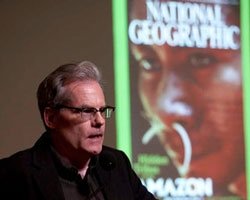As the clock ticks, trees fall in Brazil's Amazon
Former Public Policy Scholar and author of "The Unconquered", Scott Wallace, writes on deforestation in the Amazon.

Scott Wallace - National Geographic, 05/14/2012
As Brazil braces for president Dilma Rousseff’s forthcoming decision on whether to sign or veto recent legislation that would alter the country’s Forest Code, rights groups are decrying a surge in illegal land grabs that is wrecking environmental havoc and threatening vulnerable tribal populations.
According to the rights organization Survival International, a gold rush mentality seems to have taken hold of loggers, ranchers and settlers in the eastern Amazonian state of Maranhão, as intruders bore their way deeper into reserve areas set up to protect the forests of the Awá tribe. In addition to 355 contacted members of the tribe, about 100 Awá remain uncontacted, making them one of the very last groups of nomads still roaming the forests of the eastern Amazon. The majority of the 60 or more uncontacted tribes that still survive in the Amazon inhabit the more secluded and remote western regions on the vast Amazon Basin.
Survival has launched a public campaign in recent days that includes a video featuring British film star Colin Firth, best known for his portrayal of a stammering King George in the blockbuster hit “The King’s Speech.” Looking into the camera, an earnest Firth urges supporters to call on Brazil’s Justice Minister to send agents into Maranhåo to halt the destruction. “One man can stop this,” says Firth, “Brazil’s Minister of Justice. He can send in the Federal Police to catch the loggers and keep them out for good.”
About the Author
Scott Wallace
Associate Professor of Journalism, University of Connecticut

Brazil Institute
The Brazil Institute—the only country-specific policy institution focused on Brazil in Washington—works to foster understanding of Brazil’s complex reality and to support more consequential relations between Brazilian and US institutions in all sectors. The Brazil Institute plays this role by producing independent research and programs that bridge the gap between scholarship and policy, and by serving as a crossroads for leading policymakers, scholars and private sector representatives who are committed to addressing Brazil’s challenges and opportunities. Read more

Environmental Change and Security Program
The Environmental Change and Security Program (ECSP) explores the connections between environmental change, health, and population dynamics and their links to conflict, human insecurity, and foreign policy. Read more








